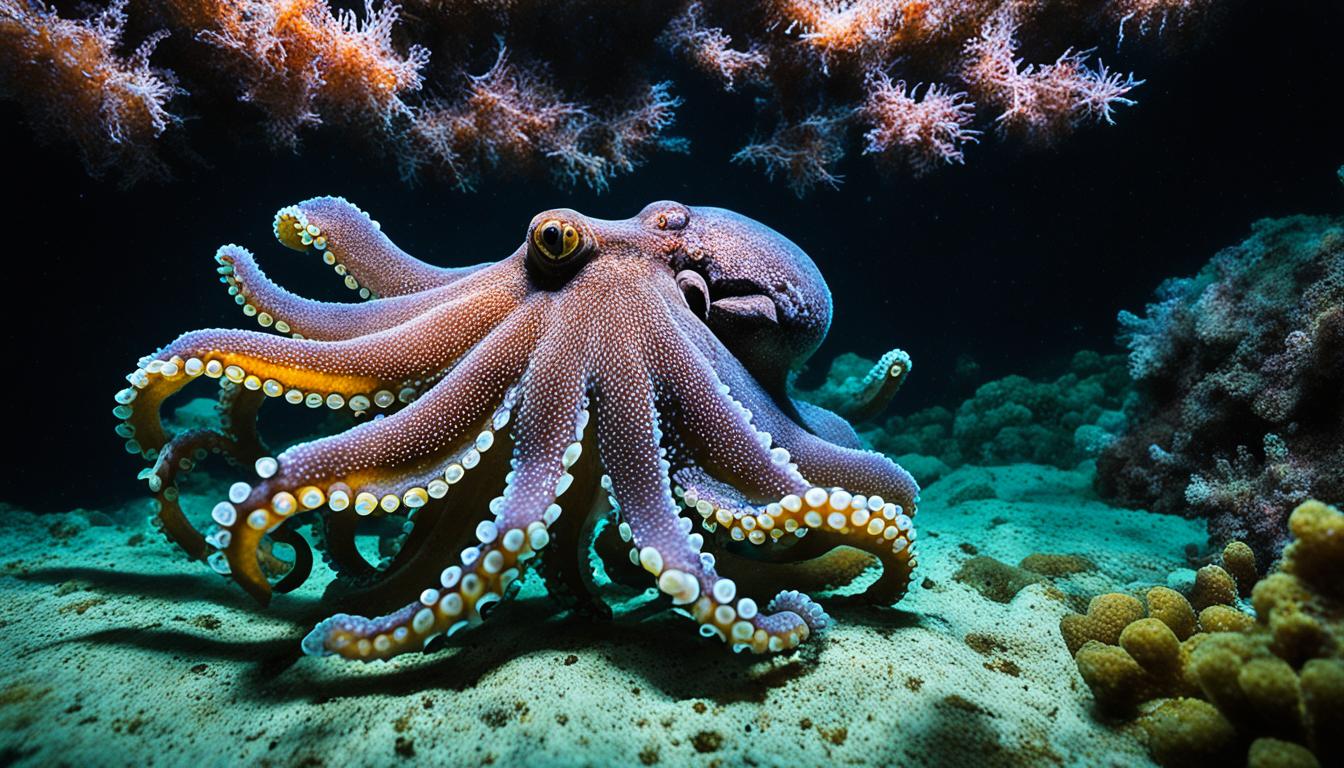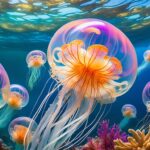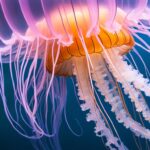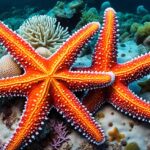Have you ever wondered where octopuses live? These amazing sea creatures are found in almost every ocean on Earth. They have eight flexible arms and are known for their smarts. With about 300 different kinds, they live in many places, from colorful coral reefs to deep sea.
Octopuses have special skills like changing color and squirting ink to survive. Knowing where they live helps us understand their important role in the ocean. Let’s explore the amazing places where these creatures call home.
Introduction to Octopus Habitats
Octopuses live in many ocean zones, making their homes diverse. They can be found from colorful coral reefs full of life to the deep, dark sea. Each place they live affects their behavior, how they eat, and how they reproduce.
Things like water temperature, salt levels, and the sea floor type affect where octopuses live. Knowing about their homes helps us understand their role in the ocean and where they can be found. Some octopuses like shallow water, while others live deep in the sea.
Where do octopuses live?
Octopuses live in many places around the world, showing how well they adapt to different ocean conditions. Knowing where octopuses live helps us understand their role in nature and appreciate their homes.
Global distribution of octopus species
Octopuses live in every ocean, from shallow waters to deep sea depths. They are most common in tropical waters, which are perfect for them. Some like the open sea, while others prefer living near rocks and coral.
This shows how well they can live in various places.
Influence of ocean temperature on habitats
Ocean temperature is key to where octopuses live. Since they can’t regulate their body temperature, they like warmer waters for breeding and eating. Many octopus types prefer these warm areas, making them gather there.
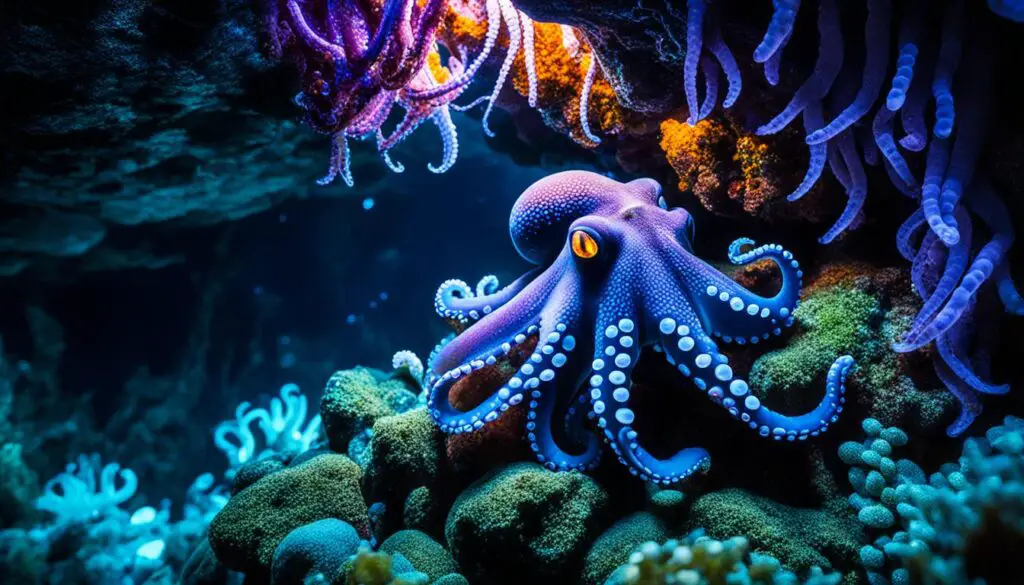
| Habitat Type | Temperature Range (°C) | Species Examples |
|---|---|---|
| Shallow Coastal Areas | 20-30 | Common Octopus, Caribbean Reef Octopus |
| Benthic Zones | 10-25 | Giant Pacific Octopus, Blue-ringed Octopus |
| Pelagic Zones | 15-28 | Open Ocean Octopus |
Octopus Natural Habitat: An Overview
Octopuses live in many different places in the ocean. They can adapt to various marine ecosystems. The places they live affect their health and happiness.
Types of habitats: Coral reefs, seabeds, and open waters
Octopuses live in several important places:
- Coral Reefs: Coral reefs are full of life and food, making them perfect for octopuses.
- Sandy Seabeds: These areas let octopuses hide and catch prey easily.
- Open Waters: Sometimes, octopuses go into open water to hunt for fish and other sea creatures.
Characteristics of an ideal dwelling place
An ideal home for octopuses has certain features. These include:
- Shelter: Octopuses need places to hide from big predators.
- Prey Availability: They need a place with lots of food to eat.
- Optimal Camouflage: Places with lots of colors and textures help octopuses hide and hunt better.
These things together make a good home for octopuses. Knowing about their homes helps us protect these amazing animals.
Octopus Habitat Locations: Regional Insights
Octopuses live in many places, showing how they adapt to different environments. Some spots are perfect for them, highlighting their diverse habitats and flexibility.
Abundance in warm, tropical waters
Warm, tropical waters are key to octopus life. These areas have lots of food, making them great for octopuses. In the Caribbean and the Red Sea, they find plenty to eat.
Coastal areas with coral reefs are perfect for hunting and breeding. This makes these places even better for octopuses. The rich marine life helps the biodiversity, with octopuses being a big part of it.
Octopus presence in deep-sea environments
Octopuses also live deep in the sea, showing how well they adapt. They can handle high pressure and low light. In the Pacific Ocean trench, many octopus species live, each with special traits for the deep.
The deep sea has its own food sources, like glowing creatures that octopuses eat. This shows how octopuses can live in many ocean areas.
Octopus Ecosystem: Interactions with Other Marine Life
In the ocean, octopuses are key players in the ecosystem. They are both hunters and hunted, playing a big role in the balance of marine life. Their hunting skills are impressive, using smart tactics to catch crustaceans. This shows how important they are in keeping the ocean’s balance.
Predation and its role in the octopus environment
Octopuses mainly eat crustaceans like crabs and shrimps. Their smartness and flexibility help them catch food effectively. This hunting not only feeds them but also keeps the number of their prey in check. This shows how vital they are in the ocean’s ecosystem.
Their actions also tell us about changes in the number of their prey. This underlines how connected the octopus ecosystem is.
Relationship with prey, like crabs and shrimps
Octopuses have complex relationships with their prey, including crabs and shrimps. These animals are crucial to their diet and show the health of their homes in the ocean. By eating these species, octopuses help manage their populations, keeping the ocean’s balance.
This shows how important octopuses are in keeping the ocean healthy.
FAQ
Where do octopuses typically live?
Octopuses live in oceans all over the world. They like warm, tropical waters and deep sea areas. You can find them on coral reefs, sandy bottoms, and in open water.
What factors influence octopus habitats?
Octopus homes are shaped by things like water temperature, food, and safety from predators. They prefer warm waters for breeding and finding food.
What are common octopus habitat locations?
Octopuses live in places like coral reefs, deep ocean floors, and deep-sea areas. These spots are safe and full of food, perfect for them.
How do octopuses adapt to their environments?
Octopuses adapt in amazing ways. They can change color and hunt in unique ways. This helps them survive in different ocean places.
What types of ecosystems do octopuses inhabit?
Octopuses live in many ecosystems, like coral reefs and deep sea. They are important as both hunters and the hunted. They help keep the ocean’s food web balanced.
Why are octopuses important to marine ecosystems?
Octopuses are key to ocean health. They eat crustaceans and are eaten by bigger sea creatures. This balance is crucial for the ocean’s health.

